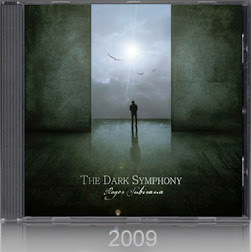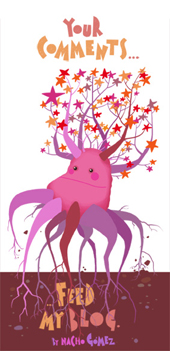 The Holy Alphabet is a fiction novel, in fact falls within what is now called historical thriller, but in reality what does this mean?
The Holy Alphabet is a fiction novel, in fact falls within what is now called historical thriller, but in reality what does this mean? Within the publishing industry, is part of as "historical thriller" those novels that have a historical basis, either because they use real people who lived long ago or because they are set in past events.
In the case of The Sacred Alphabet, the historical part refers to the Mandaeans, a religious group very interesting that existed before the coming of Jesus Christ.
Why write about history?
The story has always fascinated me. The people repeated a lots the phrase that "unless we know our past we are condemned to repeat it." I think this sentence is true, particularly with regard to our mistakes, and has been a recurrent theme in my reading. Moreover, history gives much play in creating fiction novels.
But, you not only have read historical novels ...
No, I must admit that I usually read almost any genre and all of them I learn something. It is true that in the past I almost exclusively read historical novels. Authors such as Robert Graves, Mika Waltari, Gisbert Haefs, Gore Vidal and Mary Renault, I was fascinated with their stories. But eventually diversifies. There was a time when science fiction attracted me and I read Orson Scott Card and Arthur G. Clarke, among others, but also Agatha Christie, P. D. James or Patricia D. Cornwell I have been caught with his narrative.
No, I must admit that I usually read almost any genre and all of them I learn something. It is true that in the past I almost exclusively read historical novels. Authors such as Robert Graves, Mika Waltari, Gisbert Haefs, Gore Vidal and Mary Renault, I was fascinated with their stories. But eventually diversifies. There was a time when science fiction attracted me and I read Orson Scott Card and Arthur G. Clarke, among others, but also Agatha Christie, P. D. James or Patricia D. Cornwell I have been caught with his narrative.
What all these works have influenced to a greater extent on you and your way of telling?
 I could not name you a work in particular. All of them somehow have helped me to write as I do. When you read a novel, probably the work as a whole were not exceptional, but discovers that it has discussed the psychology of the characters in a masterly manner, and stay with it. With other work can happen that what attracts you were the plot, the way the author develops the action or suspense ... For example, I wonder Jose Luis Sampedro's treatment of the characters, how they change along the work; and Stephen King, an author diametrically opposed, I admire as he gets to introduce you in their fictions.
I could not name you a work in particular. All of them somehow have helped me to write as I do. When you read a novel, probably the work as a whole were not exceptional, but discovers that it has discussed the psychology of the characters in a masterly manner, and stay with it. With other work can happen that what attracts you were the plot, the way the author develops the action or suspense ... For example, I wonder Jose Luis Sampedro's treatment of the characters, how they change along the work; and Stephen King, an author diametrically opposed, I admire as he gets to introduce you in their fictions. What you read is contemporary writers?
Like I said, almost everything. When choosing a book does not discriminate due to their subject, but rather do it on their soil quality. One thing to read everything, and quite another to pretend to enjoy works misspelled. What is the last thing you read?
Now I am immersed in the documentation of my next novel and I'm reading some works of Michio Kaku on Parallel universes, string theory ... However, the readers must not frighten, is just the starting point to spin a compelling story, action ...  For your kind of narrative, the action of your plot ... which of all the authors who have read you would have them compare?
For your kind of narrative, the action of your plot ... which of all the authors who have read you would have them compare? I think every writer has his own style, and writing influenced by the readings that they have read but also by the circumstances of their lives, which are those that have defined their characters and attitudes to events. To call someone that "is the spanish Ken Follett" or "French Perez-Reverte" it seems reducing reality to its simplest expression denoting extreme simplicity. Each author takes with him their experiences and their experiences and are not comparable with any other.
After reading The Sacred Alphabet has surprised me how well you know the information circulated on the novel for readers to digest without realizing, how do you get?
Guess it's a fairly arduous process of assimilation. You see, I'm now documented about quantum physics. Obviously I can not write a fictional novel, a fast-paced plot, writing about quarks and quanta. Someone might say: "Quarks!" What's that? ". The work of an author not only consist to narrate but it also has to dosing, almost in a millimeter, the documentation that offers to his readers. They must understand the issue, but follow the story without getting lost, without going back to reread the page to read it for lack of compression. This is accomplished when the author has digested the information that is part of the novel and when to display it on the work it does with small doses and in a way that is easy for a layman.
Your academic training has helped you to achieve that?
I think so. I'm a journalist, and one of the things they teach you very well in university is to document yourself. If your broad field of action and not only looking for literature, if you also throw the work of "field", you get a broad perspective of the topic you have to deal. Basically, the job of writing a novel begins with the search for documentation, an analysis and summary, and concludes with how to translate that into fiction. Also feels that writing an article or a story is telling a story, as in novels, to communicate something to the reader in an attractive way with a beginning, a middle and an ending, only with fewer words. Journalism is a good starting point if you want to be a writer.
Tell me about your upcoming projects. I've said that you have a new novel in mind. Can you pass something?
Rather little, and it is not superstition. Although many writers prefer not to tell if their projects are "gafan" is not my case. It is simply that the work is still in its infancy. I've barely begun to know where the plot and I will not even have well-shaped characters. Ask me earlier this year, maybe by then more data may bring. I know it is a risky question but, do you think that The Sacred Alphabet will be a bestseller?
(Laughter) I agree with you that the question is a bit risky, and who knows what will happen to The Sacred Alphabet, but I can confirm you that the publisher is currently stationed topics very strong from the start and she rarely do all the work. Furthermore, the reception given the first edition pre-sale has been spectacular. Even I could not believe it myself, and for the opinions of the readers who have already read, I can confirm you that history is enjoying it. To round off this interview, do you wish to add anything?
Let me use this occasion to send to all the readers a greeting from here and give them my heartfelt thanks for the encouraging words that they dedicate me. Thank all of you.







0 comments:
Post a Comment